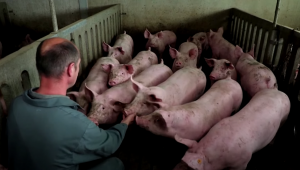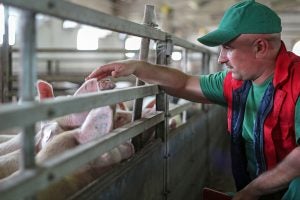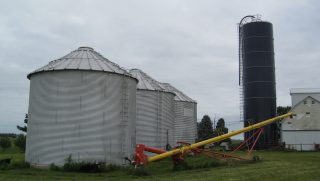In a 5-4 decision, the Supreme Court of the United States has voted to affirm California’s Proposition 12 — legislation that bans the sale of pork, veal, and eggs in California from livestock that wasn’t raised according to the state’s production standards, no matter which state in the U.S. the animals were actually raised in. Oral arguments before the Supreme Court were made in October, and tension had been brimming for several months in anticipation of this SCOTUS decision.
Prop 12, which has long been expected to massively impact the nation’s pork industry, has been one of the most contentious legislative steps in modern California history. It sparked lawsuits from the American Farm Bureau Federation, the National Pork Producers Council, and the North American Meat Institute, all of whom challenged the constitutionality of Prop 12, largely based on the impact it would have on interstate commerce. Pork producers themselves have stated that the legislation would wrongly impact other states and impede national markets, setting a precedent where a state could aggressively regulate the actions of another (e.g. dictating the type of tractor used on a farm or whether robots can be used for milking).
The measure was originally passed in 2018 with the backing of more than two-thirds of voters and was supposed to go into effect Jan. 1, 2022, but its implementation had been delayed until July 1 of this year because of the challenge to the Ninth Circuit Court of Appeals and its consideration before the nation’s high court in the case officially titled, National Pork Producers Council, et al. v. Karen Ross, in Her Official Capacity as Secretary of the California Department of Food & Agriculture, et al.
The central question before SCOTUS was: “Does a California law that prohibits the in-state sale of pork from animals confined in a manner inconsistent with California standards violate the ‘dormant’ component of the Constitution’s Commerce Clause?”
Justice Neil Gorsuch, a Trump nominee, delivered the opinion on behalf of the court. In it, he said:
“The Framers equipped Congress with considerable power to regulate interstate commerce and preempt contrary state laws. While this Court has inferred an additional judicially enforceable rule against certain state laws adopted even against the backdrop of congressional silence, the Court’s cases also suggest extreme caution is warranted in its exercise. Disavowing reliance on this Court’s core dormant Commerce Clause teachings focused on discriminatory state legislation, petitioners invite the Court to endorse new theories of implied judicial power. They would have the Court recognize an ‘almost per se’ rule against the enforcement of state laws that have ‘extraterritorial effects’ — even though it has long recognized that virtually all state laws create ripple effects beyond their borders.”
Agricultural groups also expressed concern that such a law would increase production costs to farmers and grocery-store prices for consumers — a significant concern in a state where nearly 1 in 5 people (about 8 million in all) already struggle with food insecurity. An opinion piece published in the Times of San Diego stated, “Prop. 12 disproportionately impacts our most-vulnerable Californians who likely cannot afford rising food prices on basic staples like eggs and pork. As it stands now, overall food prices are higher than ever before and are already hitting our most vulnerable and neediest populations.”
The NPCC estimated that the cost to farmers to implement Prop 12 measures — such as guaranteeing breeding pigs at least 24 square feet of living space — will come at a cost of $3,500 per sow.
“Prop 12 remains a costly burden to producers and provides no benefit to animals or consumers,” Julie Anna Potts, president and CEO of the North American Meat Institute, said after the court’s decision was announced. “We are disappointed in the Court’s decision and will carefully study the ruling to determine next steps.”
The ruling found many politically opposed justices siding together. Gorsuch was joined by justices Clarence Thomas, Sonia Sotomayor, Elena Kagan, and Amy Coney Barrett. Chief Justice John Roberts led the dissenting opinion and was joined by Samuel Alito, Brett Kavanaugh, and Ketanji Brown Jackson.

California’s Solicitor General Michael Mongran has argued that Prop 12 does not place restrictions on out-of-state pork businesses, saying, “If [a state] adopts a regulation that is just too burdensome to comply with, then the industry will stop serving a state, and the state has to decide, ‘Do we want a regulation or do we want pork?’”
Other supporters of Prop 12 — including major activist groups such as the Humane Society of the United States — maintained that the law would have protected animals from “cruel” and “extreme” confinement.
“We’re delighted that the Supreme Court has upheld California Proposition 12 — the nation’s strongest farm animal welfare law — and made clear that preventing animal cruelty and protecting public health are core functions of our state governments,” said Kitty Block, president and CEO of HSUS. “It’s astonishing that pork industry leaders would waste so much time and money on fighting this commonsense step to prevent products of relentless, unbearable animal suffering from being sold in California.”
In 2021, the California Department of Food and Agriculture admitted that the self-titled Prevention of Cruelty to Farm Animals Act would increase pig mortality on breeding farms and had no positive impacts on human health and welfare, worker safety, or the environment. U.S. Solicitor General Elizabeth Prelogar, who is a Biden appointee, even filed an amicus brief with the high court supporting the pork industry’s position.
The U.S. Supreme Court is viewed as being conservative-leaning, with six of the nine justices tending to lean that way ideologically. There was much speculation in the walkup to today’s ruling about exactly how this court would decide — recognizing that it may not have been as straight-forward as affirming or overturning the law. Sending the case back to the lower court for further proceedings was among the possibilities.
“The Prop 12 case is a really big deal,” agricultural columnist and blogger Amanda Zaluckyj said last year as the frenzy around the legislation intensified. “It could finally be the death of these nationwide state laws. Activists will no longer be able to go into a state with a population sympathetic to their message and pass laws that dictate production requirements to anyone selling products in that state. Instead only the state where a farm is located can impose regulatory burdens on farmers.”



